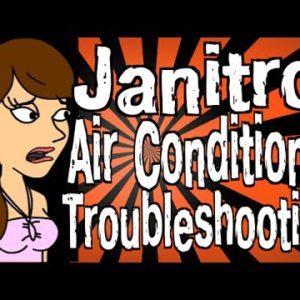I need your advice on Janitrol air conditioner
troubleshooting. The AC coils tend to go out every two years. Then again, there’s a class action lawsuit
against Goodman and Amana for making coils too thin to handle the high pressure refrigerants
that replaced Freon. I have a Janitrol AC, not Goodman. Janitrol was bought by Goodman HVAC in 1982. That means that Janitrol labeled systems are
actually Goodman units these days. AC coils tend to leak anyway. And as you said about the high pressure, that
means they are more likely to leak at the valves too. You can guess it is a refrigerant leak if
the unit works longer and harder to get the house just as cool.
You know it is a refrigerant leak if the coil
is iced up on one portion of the coil is frozen. No, it is not covered in ice. I do not think Janitrol ACs are advanced enough
to have a defrost heater on the AC coils. You could have a refrigerant leak without
ice, generating excess moisture in the unit. That sounds like problems with ice build up
in my refrigerator’s freezer. We learned about the excessive ice when the
defrost heater kicked in, generating more melt water than the drain could handle, causing
it to flood. If the drain pan cannot handle the condensate,
causing water to accumulate in the bottom of the unit, that may be a sign of a refrigerant
leak.

Or a sign I need to replace the air filters. That traps moisture around coil that is otherwise
vented outside. In theory, really bad air flow around the
coils could cause it to freeze too. However, that’s easy to diagnose, based
on how black the air filters are. They probably do need to be changed. If you hear banging around the compressor,
you may have a refrigerant leak. If you hear bubbling and popping, you know
it is a refrigerant leak.
What else indicates a problem, specifically
a problem that is not a refrigerant leak? If the AC is on fire, you know it probably
had an electrical problem. An AC on fire is not consolation for knowing
what’s wrong with it. And a motor overheating could cause it to
catch fire, not just an electrical short. Most ACs have sensors to monitor the unit’s
temperature and shut it down if the motors or unit exhaust get too hot. If the AC keeps shutting off after running
for a while, and it is not a thermostat war, the motors and other parts overheating may
be it. How could I tell if that’s the issue? I mean, it is going to be hot under the summer
sun. The AC should give you error codes on the
control panel to show that it shut down because something was too hot, and the error code
says whether it is an electrical short, fan motor, compressor or so forth.

